graphic
by Irina Serikoff
© 2005
|
INDEX
of Matt Taylor Papers
2005
|
| In
June, 2005, Architects of Group Genius, TomorrowMakers
and MG Taylor sponsored a DesignShop in Liechtenstein
to look at the future of what I call the “Big
E” - the ValueWeb that is emerging [link] around
the practice of GroupGenius. |
| In
preparation for the DesignShop, Irena Sokolona
drew a wall graphic based on a remark that Daniel
Boorstin had made in The Discovers [link],
it was only after map makers took “here be
dragons” off of their maps and replaced the
dragon images with “Terra Incognita,” that the age of exploration could begin. This was a
reminder
to us all that if we are to build a true ValueWeb,
in today’s world, that we would have to banish
many of our personal and corporate dragons. |
| Personally,
I like dragons and think that they have been given
a bad rap in our society. I also think, along with
the late Louis Mumford [rbtfBook], that
the Medieval period is “known” to most
of us through the distorted lens of the Victorians
who often though of themselves as the ultimate
height of civilization. Most of what we think negatively,
according to Mumford, about the Medieval city
is what happened to those cities in the period
of growth and squalor that followed the true medieval
period. There is controversy about how flat most
people’s
thinking before Columbus really was [link]. |
| Nevertheless,
the dragons were removed from the maps when the
age of exploration was undertaken in the West and
it makes a good story even if China was
there first [rbtfBook]. |
| There
is a higher truth embedded in the story no matter that the
history is more complex than the prevalent social
myths of the West would indicate.
The graphic makes a good Masthead for this INDEX.
Even the controversies add to the meaning.
We will just have to live with the fact that there
are, apparently, good dragons and bad ones and
many shades of historical (and hysterical) truth. |
| “Here
be Dragons” is wise caution for the papers
listed in this index - perhaps, for this entire
web site. It is good to remember that there is
a good deal more to most things than we often realize.
It is important to remember that we humans face
a number of complex, circumstances of our own making
and that our margin of time to deal with them - creatively and with good craftsmanship - is getting
ever more short. |
| It
is worth a
reminder, that this web site is a NOTEBOOK.
Like every posting on it, the following are works
in progress. And, I remind you - if you are to
get my intended meaning - that everything on this
site has to be taken in context of everything on
it. And, that I am reporting my experience of reality
- the only utility of this material, for you, is the
thinking that you do in response to it and how this thinking
is translated into action by what you subsequently
go do. If this happens and if it leads to good, then I will have accomplished the primary purpose of this virtual publication effort. |
|
click
on the images to go to the Papers |
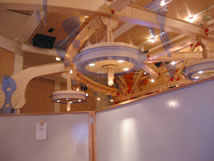 |
DAVOS
05 IMAGES
Images
and notes: the 2005 RDS deployment
to the World Economic Forum Annual Meeting. Will
world leaders collaborate? |
|
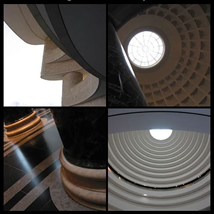 |
MAKING
NATIONAL SYMBOLS
A
criticism of two museums, on the National Mall
in Washington DC, built 50 years apart with reflections
on how they represent aspects of the US national
Character. |
|
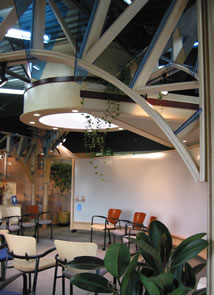 |
MAKING
PLACE
A
tour of Taylor work environments, built over
a 20 year period, with an essay outlining the critical
factors necessary for making environments supportive
of the creative process and collaborative interaction.
These projects make up a body of work that contest
the popular view of what makes a human workplace. |
|
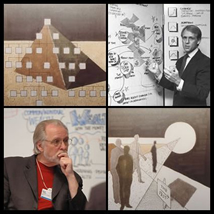 |
ORGANIZATIONAL
TRANSFORMATION
A
personal perspective, based on 25 years direct experience,
about the process of organizational transformation and
the role of the Transition Manager. |
|
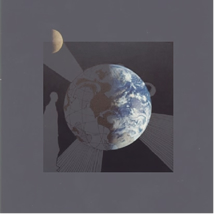 |
PLANETARY
ARCHITECTURE
The
case for paying attention to and taking responsibility
for the fact that humanity is rapidly tuning
Planet Earth into a human artifact. It outlines
a program to respond with care and craft.
|
|
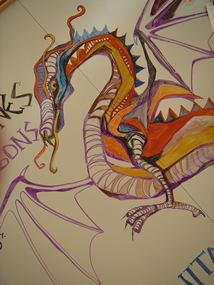 |
SCENARIO
EXERCISE
Four
Scenarios, based
on a set of future drivers presented by Al
Gore at the session, written for the iNet Private
Wealth Council Workshop at Bad Ragaz, June
2005 with
comments on employing scenario exercises in
group design processes.
|
|
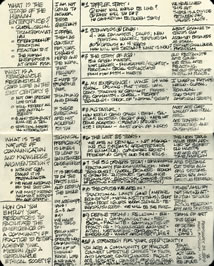 |
UMC
Presentation
A
look at the future presented to the United Methodist
Convention in February 2005 - a return to Future
Views and Weak Signal Research. This presentation
was well received and it was a great deal of fun
to offer these ideas up. |
|
more papers listed following the commentary below |
| The
first Six papers, started between mid December of 2004
and June 2005, have a great deal in common in
circumstance, sequence, content
and implications for the near future. They were written
at a key transition moment of MG Taylor as we moved
deeper into the iteration6 process [link]. The
seventh, PLANETARY ARCHITECTURE, was drafted
in early July. It is significant for three reasons.
First, it
addresses a real, long term complex social issue
that I have been concerned about for over 25 years.
This is the kind of challenge we created MG Taylor to
address. Second,
it
stands
on
the shoulders
of
six
years of
work on this web site. Without this prior work, this
paper would not be possible because the supporting
links would not exist. Third, it signifies the intention
of turning the focus of
my
web site
away from an almost exclusively inner meditation
and exploration to starting to communicate to a broader
audience what my nearly 50 years of thought and work has been about
and what the implications are for our society in the years ahead.
These Papers are a first step in my “going public.” |
| The eight, ninth and tenth papers, started in early August, 2005, make a set at the opposite end of the scale represented by Planetary Architecture. They deal with individual living and small scale work environments: WHAT MAKES AN USONIAN AN USONIAN? THE NATURAL WORKPLACE and THE TAYLOR SYSTEM - The next Generation. Just as our society is failing to respond to the large scale consequences of the sum of our actions, we are also neglecting what is happening on the individual, team and group level. These Papers describe my application of Wright’s Usonian principles to the contemporary living and workspace and the next generation of Taylor Work environments based on a 7 Domains Model Audit of our present and near future capabilities. |
| These 10 Papers, plus the two described below, will constitute my 2005 output in this part of my web site. As noted, this effort represents a shift in the focus of this web site from “past” history toward contemporary and future work. Of course, it is not as simple as that - the past, present and future are a single fabric. At any rate - these Papers do reflect my 2005 experience and work focus in context of the past and the future which I wish to build and be part of. |
| In time, they will be further developed by another iteration of work and produced as a print friendly pdf. Sometime in 2006, I think. |
| I
do not consider these to be “finished” papers. They
are drafts. As they develop, they will become the
basis for a variety of future publications. They
are a
step between the “raw” notes that make up the majority
of this site and the “polished” state necessary for
formal publication. In this, I am speaking about
the writing. The ideas in these papers are
ones that I have long considered and have applied
often in real practice. This is a “reporting” not
a speculation. While many of these concepts have
been
shared with
co-workers and clients in the process of making environments
and facilitating the future plans for, and transformation of, many organizations,
few of them have circulated in the broader social/politic of our world. It is time that they become
part of a greater dialog. It is in this spirit that
they are shared here even in their present primitive
form. |
|
click on the images to go to the Papers |
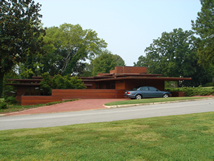 |
ROSENBAUM USONIAN
What makes an Usonian an Usonian? This piece explores this subject and presents a model and set of principles that can be applied to future works. |
|
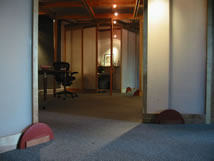 |
THE USONIAN WORKPLACE
The same principles and building approach that created the Usonian living space can be applied to the workspace. |
|
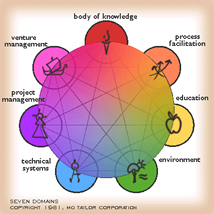 |
7 DOMAINS MODEL
2005 Vision
We are completing a long development cycle of the Taylor System and Method. The Capacity now exists to recreate this work and produce a new generation of the METHOD. |
|
| The 11th Paper, UNNATURAL DISASTER - The RDS Alternative, is focused on a complex and controversial circumstance of Hurricanes Katrina and Rita. Complex, because the factors that lead to this disaster are many and usually not considered when the analysis and finger pointing begins. Controversial, because my point of view is that that Nature created the circumstance but humanity created the disaster. And, we made victims of ourselves because we failed on the fundamental requirement of life: that of seeing to our own security. Katrina reveals how fragile our civilization actually is and that this has been brought about by fragmented efforts, the tragedy of the commons and just plain incompetent design. We will have many more of these, nature and human-made (which are now inextricably intertwined), if we fail to challenge the process architecture our organizations - including their work processes and technology - use, and the physical environments and infrastructure that we build. |
| The 12th (and, I expect, the last this year) Paper addresses the phenomenon of the USA Myth. It is Titled THE FLAW IN THE AMERICAN MYTH - rewriting the script for reasons that the paper should make clear. This paper explores how our self-image programs what we do and how this is leading to serious global consequences. Every society has a set of defining myths and tends to live - and die - by them. Reinventing its myth is a society’s first step toward reinventing itself. The USA has run a complete cycle of the creative process. It has been a great run - there is no question about that. The question which remains is how will we recreate ourselves and what will be the consequences of the choices we make? Will the USA be a force for good in a viable future or an obstacle to it? At the moment we are at the cusp, the fork in this road. We have taken the first halting steps down the wrong path. We must honestly reassess who we are and what we have become if we are to again find our roots and recreate our society. |
|
click on the images to go to the Papers |
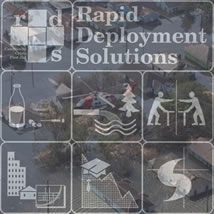 |
THE RDS ALTERNATIVE
The RDS environment can be employed to relieve suffering by facilitating integration of relief efforts while starting the re-Visioning process so that we do not rebuild just a “stronger” version of what clearly failed. |
|
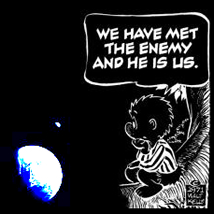 |
REWRITING THE SCRIPT
POGO contemplates the future of Planet Earth and Humanity. This Paper focuses on the Mythos of the USA and how this frames our thinking and actions and, thus, our impact on the world. |
|
| In total, these papers make a set in multiple ways. There are several themes - or red threads - that unit them. It was last September that an Architects of Group Genius Workshop with the World Economic Forum lead to the deployment of the RDS to Davos in 05 creating the Davos WorkPlace. This was the first deployment of the RDS to address complex issues in a global setting. The exercise at Bad Ragaz with the Private Wealth Council followed - the second deployment in less than a year. As of this posting (September 2005), we are in dialog and planning to make the Davos Workplace a permanent fixture of the WEF Annual Meetings and their quarterly events. At the same time, a NavCenter is being set up in Liechtenstein to continue work with the Private Wealth Council, European governments and businesses seeking to reinvent themselves. Over the last 18 months a shift has taken place in both business and government. This shift is a return to deep systemic, transformational change in major institutions. The go-go nineties and the malaise of the first few years of this decade are giving away to a renewed determination, on the part of some, to recreate the way that profit, non profit organizations and governments do business. Our level of dialog with consulting firms and businesses interested in applying the MGT Method to their work has been many times greater, in 2005, than the entire decade before. And, of course, our society has had several reminders that even those things we thought were safe and secure are not - and, that there are long term, large scale consequences of human actions and the time has come to address them. This last point is illustrated by the fact that I have received more requests to attend conferences, participate in issue focused groups and give keynote talks in the last year than the sum of my professional work. As I do not promote myself to do these things and my core message has remained consistent for 30 years, I interpret this interest as evidence of a shift in awareness among the public - an encouraging Weak Signal. |
| This is convergence. All of the elements of the last 50 years are combining to merge intent, capacity, social/market awareness with a global agenda the focus of which is designing and building a viable human civilization in concert with a healthy planet. This is far from a done deal, of course. What is new is that the major issues, relevant to it, are now on top of the table for all to see. |
| The 12 Papers, published, in 2005, address a number of these converging trends and issues. They highlight aspects what for me and MG Taylor has been a difficult, sometimes frustrating, demanding, exciting, financially challenging and, ultimately, rewarding year. The saying “I love it when a plan comes together” comes to mind. When completed, these 12 Papers, and the Red Thread companion piece, will constitute a book length document. |
| It is my intention, for the rest of 2005, to refrain for starting new papers beyond these twelve for several reasons. My time through next January will be consumed with DesignShop® events and discovery sessions associated with what I have accounted above. The time I will have for writing will be best spent finishing these 12 pieces and filling in the considerable amount of material that is connected to them and supports them. These Papers fame of year - a year of transition for MG Taylor as it has migrated from an organization to a functioning ValueWeb® capable of doing the work we set out to do 30 years ago. This is iteration6 of our development, the next to the last which will be the completion of our mission: the development of and the broad distribution and transfer to ubiquity, of a global social transformational capability. |
|
| It takes perspective and, thus some time, for Red Threads to reveal themselves. It will take me several months to find them and document them. So, this final section of the 05 Index will be written as the work on 06 Papers progresses. And, there will be feedback - as 06 subjects emerge - to the 05 work. |
|
click on the images to go to the Papers |
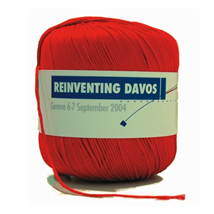 |
THE RED THREADS
Red Threads are woven through the entire structure of what ever it is that they are a part. Some are obvious - others more subtle. The Red Treads also reach out beyond these 12 Papers to my entire site and beyond. |
|
And Finally... The Start of 06 Papers |
| No sooner than I decided to end with the twelve 05 Papers, and incident provoked me to start a new Paper [link: why mg taylor is a business]. It was a dialog with an associate and friend about the nature of business in the 21st Century and my role as CEO of MG Taylor that stimulated this pieces [link: index to 06 papers]. This, of course is not unrelated to the 05 piece on organizational transformation only, in this case, the subject is MG Taylor and myself - not one of our client partners. In a way, these two Papers, Organizational Transformation and Why MG Taylor is a Business, close a cycle of experience and thought. Why MG Taylor is a Business is placed as the first of the 06 papers because I believe that it will turn out to be more relevant to the year ahead than to the one that is nearly past. All indications are the MG Taylor is entering a new cycle of its own development and that is becoming a successful business even as it transforms into the role of systems integrator of a successful ValueWeb [link: iteration6] - in doing both it becomes a true example, of one, of a viable 21st Century organization. |
|
|
|
| Return
To 2005 Papers Index |
|
|
|
|
| GoTo 2005 Papers Red Threads |
|
|
|
|
| GoTo: Critera for Making Architecture |
|
|
|
|
| GoTo: Davos 2005 - IMAGES |
|
|
|
|
| GoTo: Facilitating Complex Emergent Systems |
|
|
|
|
| GoTo: Feedback: Adding Extreme to Extreme |
|
|
|
|
| GoTo: Gaia Project - Who represents Earth? |
|
|
|
|
| GoTo: iteration6 - organization to ValueWeb |
|
|
|
|
| GoTo: iteration6 - personal reflections |
|
|
|
|
| GoTo: Master Planning Process |
|
|
|
|
| GoTo: Matt Taylor - Hand Written Nootebooks |
|
|
|
|
| GoTo: Planetary Architecture - The case |
|
|
|
|
| GoTo:Rebirth at Ground Zero |
|
|
|
|
| GoTo: ReBuilding the Future |
|
|
|
|
| GoTo: Return of the Usonian |
|
|
|
|
| GoTo: Story of a Masthead |
|
|
|
|
| GoTo: THESIS: Making Authentic Architecture |
|
|
|
|
| GoTo: ValueWeb Architecture |
|
|
|
|
| GoTo: Work Retreat - February 2005 |
|
|
|
Matt
Taylor
Liechtenstein
June 20, 2005
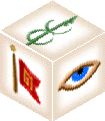
SolutionBox
voice of this document:
VISION • STRATEGY • EVALUATE
|
posted:
June 20, 2005
revised:
April 16, 2005
• 20050620.651911.mt • 20050621.456700.mt •
• 20050905.540099.mt • 20050911.879821.mt •
• 20050927.111100.mt • 20051105.222200.mt •
• 20051113.555500.mt • 20060416.118872.mt •
(note:
this document is about 98% finished)
Copyright© Matt
Taylor 2005
|
|
|